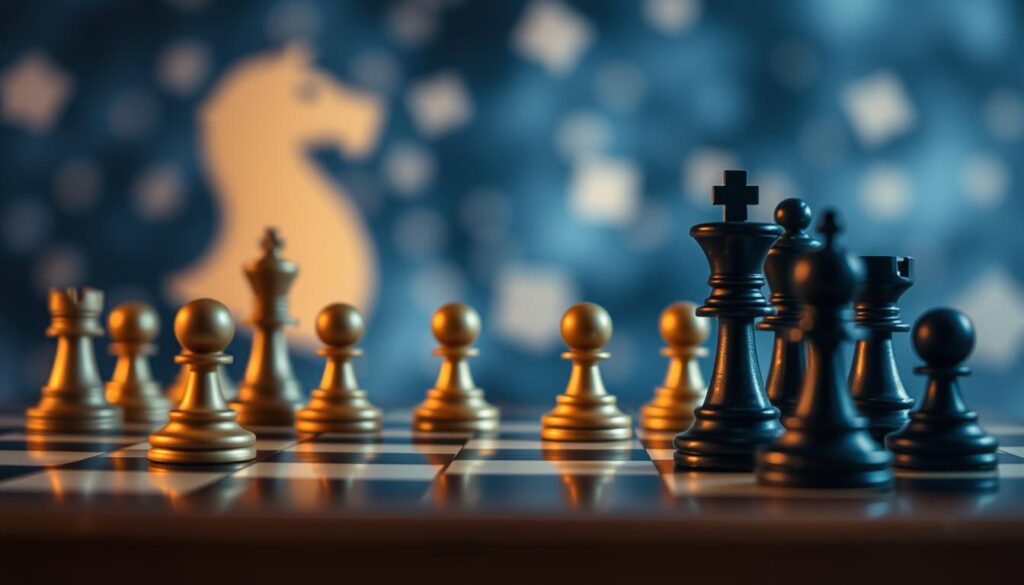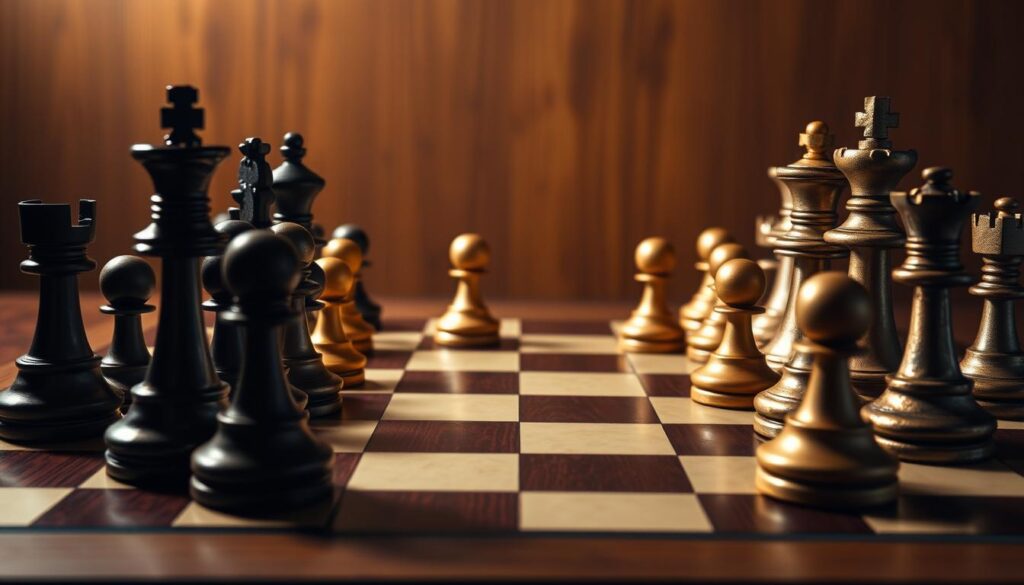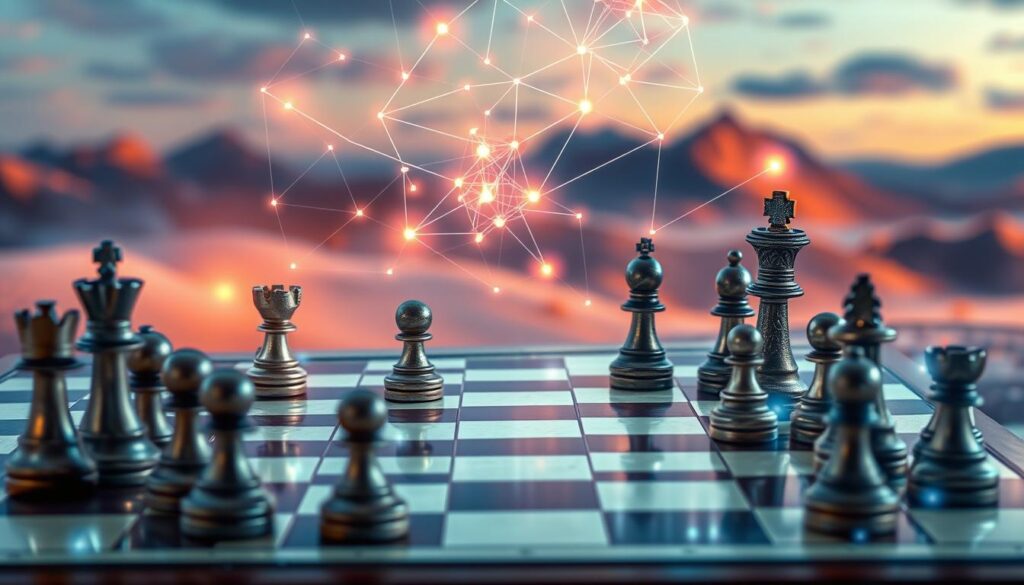When the chessboard is empty, its pieces seem to call out for a challenge. For those who love chess, beating it alone is a tempting goal. I’ve played against myself for years and have learned a lot.
Chess is all about strategy and solving problems. Each move can open new paths or close them. Playing alone makes every mistake stand out, but it’s a chance to improve.
Table of Contents
Understanding the Psychology of Solo Chess Play
The psychology of solo chess play is fascinating and often overlooked. As you start your journey in one-player chess, it’s key to grasp the mental strategies needed for success. The psychology of chess, including recognizing patterns and making decisions under pressure, is crucial for your performance.
Maintaining focus and self-awareness is a big challenge in solo chess. Without an opponent, you must be your own toughest critic, always checking your moves and adjusting your mental strategies for chess. A strong, disciplined chess mindset is vital for solo play, helping you avoid emotional biases and blind spots.
Managing your emotions is also key in solo chess. Without a physical opponent, it’s easy to get too caught up in the game’s outcome. This can lead to frustration or feeling like you’ve failed personally. Learning to stay balanced and objective can help you make better decisions and improve your game.
Successful solo chess players are highly self-aware. They can spot their own thought patterns, biases, and emotions. By being aware of these, you can tackle the psychological challenges of solo games better. This lets you focus on the game’s strategy and tactics with clarity and confidence.

Solo chess also demands specific mental strategies for chess, like recognizing patterns, making decisions under pressure, and seeing moves ahead. improving chess visualization can boost your solo play and prepare you for competitive chess.
Understanding the psychology of solo chess is a key step to becoming a better player. By developing a strong chess mindset, managing your emotions, and improving your cognitive skills, you can reach your full potential in one-player chess.
How to Beat One Player Chess: Essential Opening Strategies
Learning chess opening strategies is key to beating computer opponents. The Chessnut Air app and Chess Piece Sensor Chips Set make learning fun for beginners. Start by controlling the center, moving your pieces well, and keeping your king safe.
Think about your playing style when picking chess opening strategies. The Ruy Lopez is a favorite among players and fits many styles. Practice your chosen openings to build confidence and skill in the early game.
Mastering chess opening strategies means thinking ahead and being ready for your opponent. Focus on controlling the center, moving your pieces well, and keeping your king safe. This will help you beat your one-player chess opponents.

how to beat one player chess
| Tactic | Importance | Example |
|---|---|---|
| Control the Center | Crucial for mobility and influence over the game | Occupying the central squares (d4, d5, e4, e5) |
| Develop Pieces Efficiently | Supports control of the center and attacks | Bringing out knights and bishops to active squares |
| Ensure King Safety | Crucial defensive aspect of chess strategy | Castling early to protect the king |
Mastering Advanced Calculation and Visualization
Getting better at chess calculation techniques and chess visualization skills is key to beating computer opponents. It also helps improve your chess tactics. The best way to get better is through consistent practice.
Begin by solving tactical puzzles every day. This boosts your ability to recognize patterns. The Chessnut Air app has lots of puzzles to help you get better. It’s important to think ahead and imagine different board setups. This helps you find winning moves and avoid mistakes.
The book “Improve Your Chess Calculation” by RB Ramesh says that experienced players should focus on learning about forcing moves. These are moves that check, capture, or threaten. Ramesh recommends solving studies for 3 to 4 hours a day for 3 to 5 days. This has helped many players improve their calculation skills.
Ramesh also stresses the need to practice in tough situations. This builds your ability to handle difficult moments. The Chess Gym approach also focuses on improving calculation and analytical skills through daily practice.
| Practical Strategies | Visualization Techniques |
|---|---|
|
|
By practicing these chess calculation techniques and chess visualization skills every day, you’ll get better at improving your chess tactics. This will help you beat your computer opponents.

Practical Chess Exercises Training Methods for Solo Improvement
Improving at chess takes regular practice, especially when you’re playing alone. Use online tools like Chessnut Air to play against AI. You can adjust the difficulty to make the games harder as you get better. *how to beat one player chess*
Looking closely at your games is key. Find out where you went wrong and how you could have done better. Learning from chess masters can also help. They show you how to make smart moves and think ahead.
Joining online chess groups is also helpful. Talk about strategies with others, learn from their games, and get feedback on yours. Being part of these discussions can deepen your understanding of chess and teach you new ways to improve.
| Recommended Training Activities | Time Allocation |
|---|---|
| Playing against AI opponents on Chessnut Air | 20 minutes |
| Analyzing your own games and identifying areas for improvement | 15 minutes |
| Studying games of chess masters | 10 minutes |
| Engaging with online chess communities | 5 minutes |
By setting aside time for these activities, you can improve your chess skills. This will help you do better in solo chess games.
Conclusion
Your chess journey is a never-ending quest to get better and learn more about yourself. Face the challenges of playing against computers and use online resources to boost your skills. Practice regularly, think strategically, and stay positive to succeed.
As you get better, celebrate your wins and set new goals. The digital chess world is vast and exciting, offering a chance to connect with players worldwide and try new training methods. Keep growing, and you’ll find endless rewards in chess.
Mastering chess calculations is more than just winning games. It’s about sharpening your mind, building mental strength, and enjoying the game. Start this lifelong adventure and let your love for chess lead you to new heights of skill and happiness.
FAQ
What is the key to success in one-player chess against computer opponents?
To beat computer opponents in one-player chess, focus on making fewer mistakes. In amateur games, 80% of the outcome comes from errors, not strategy.
How can solo chess players develop the right psychological approach?
Solo chess players need to be aware of their own thoughts and feelings. They should stay focused and manage their emotions without a human opponent. Understanding chess tactics and making quick decisions is key to winning solo games.
What are the essential opening strategies for beating computer opponents?
To beat computer opponents, mastering chess openings is vital. Control the center, move pieces well, and keep your king safe. Pick openings that fit your style and practice often to build confidence.
How can players improve their calculation and visualization skills?
Improving calculation and visualization is crucial. Solve tactical puzzles every day to get better at recognizing patterns. Practice thinking ahead and imagining different board setups. This helps you find winning moves and avoid mistakes.
What are the key methods for improving at one-player chess?
Regular practice is essential for getting better at one-player chess. Use online tools and apps to play against AI with different levels of difficulty. Analyze your games and study chess masters to learn advanced strategies.
Join online chess communities to share strategies and learn from others. This helps you grow as a player.

















